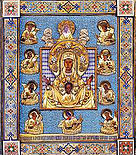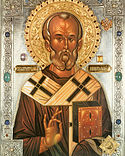Where is the True Church?
The contemporary state of Russian churches of True Orthodoxy presents a dismal picture: there are some 60 bishops divided among approximately 16 church groups that do not participate in the apostasy of World Orthodoxy. The dismay is prompted by the fact that the groups not only do not share communion with each other but instead excommunicate each other. Whenever any of these groups holds a meeting of its Council of Bishops, not the least of their goals is usually to defrock bishops of opposing groups.
What is the reason for this fragmented state? What is preventing the establishment of Eucharistic communion between True Orthodox groups who profess the same dogmas of faith?
First of all, this fragmentation arises from a lack of goodwill among the bishops, and especially among the first hierarchs of these church groups. But if we leave aside human weakness, the main reason for this fractured state is a mistaken interpretation of dogma on the unity of the Church.
In a number of these groups, an ecclesiology of zealotry has been cultivated. This ecclesiology is a simple logical scheme that is based on the premise that bishops who belong to One Church always maintain Eucharistic communion with one and other. Therefore, every time that communion is broken between two church groups, this logic dictates that one of these groups has inevitably fallen away from the Church, because the Church is one and there can be no separation within it. Thus, by the process of elimination, the zealots conclude that they in fact represent the Church of Christ (in their minds there is no doubt that their group belongs to the Church), and that the other church groups are schismatics lacking grace.
The flaw of this kind of reasoning is betrayed by its very logic. The life of the Church is governed not by the laws of logic, but by the Holy Spirit. In the zealots’ logical construct, God’s grace is represented as some sort of soulless, elemental force. However, though the forces of nature are soulless and predictable, they are not at all dependent on the researchers that study them. As for God’s grace in the logical constructs of these “theologians”, it is also entirely obedient to their assertions.
The Holy Spirit established the canons of the Church but the Holy Spirit Himself is not constrained by any rules. The Holy Spirit established these rules for us not for Himself. “The Spirit breathes where He wishes” (John 3:8), and acts as He wishes, not as some theorists would prescribe for Him. What a naive conviction that the grace of the Holy Spirit will act exactly according to the logical calculations of some armchair “theologians!”
In the same vein, such logical constructions lead to erroneous results, if only because they are based on an erroneous premise. Namely, that Eucharistic communion between bishops is always synonymous with the spiritual unity of the Church. The history of the Church refutes this postulate.
One can point to many examples from history of two church groups who were not in communion with each other, but who still both belonged to the Church. For example, the Antiochian schism in the 4th century between St. Meletius of Antioch and Bishop Paulinus. Bp. Paulinus was consecrated for the Antiochian Orthodox community by the bishops of the Orthodox West and was in communion with them. He refused to enter into communion with St. Meletius, who had been consecrated by the Arians, although St. Meletius maintained communion with the Orthodox bishops of the East.
Ecclesiastical communion between bishops is a visible manifestation of the spiritual unity of the ecumenical Church. St. Cyprian of Carthage expressed this perfectly: “The catholic church is one, inseparable and unbreakable, but everywhere united and connected together by the common bonds forged among its pastors …” (Epistle 69.8). However, these words depict the Church in a peaceful state while we live in a time of troubles for the Church.
In cases where communion between church groups is obviously broken, spiritual unity between them can be preserved, and in this manner, spiritual unity can be maintained with the Church and with each other, even when the groups are no longer in communion. Ecclesiastical communion can be interrupted as a result of personal misunderstandings between bishops. But the Church is not a fragile thing, the gates of hell cannot overcome the Church, and thus it is impossible to accept that the Church can be so readily destroyed because of human limitations or stubbornness.
In the lifetime of St. Basil the Great, the Church in the eastern part of the empire found itself in a position that can be analogized with the present. In the words of St. Basil, the Church in his time was “like an old coat, which is always being torn and can never be restored to its original strength” (Letter 113 [109]). Arianism was already segregated into a separate structure but among the Orthodox there was no unity. Suspiciousness was widespread, every bishop feared entering into communion with another, suspecting him of being unorthodox. St. Basil and like-minded bishops toiled mightily to unite the separated church groups and the basis for this unification was laid in the Nicene Creed of the 1st Ecumenical Council.
But it must be noted that, first, St. Basil when entering into communion with this or that bishop, did not interpret this communion as indicating that the bishop was also introduced into the Church from which he had been previously rejected. St. Basil considered all Orthodox bishops as belonging to the Church by virtue of their Orthodoxy. All Orthodox-minded bishops were regarded as belonging to the One Church of Christ, and the absence of Eucharistic communion between them was considered a deficit that needed to be corrected.
Secondly, the issue was only about Eucharistic communion, and not about joining some sort of administrative structure. That is, the question of communion was considered exclusively from a dogmatic and not an administrative perspective.
In some of the ROCA fragments, membership in a “canonical” jurisdiction is considered to be of paramount importance. The criterion for canonicity, in their opinion, is continuity from the former ROCA, as the pre-schism ROCA was the only legitimate successor to the Russian Church. The masterminds of such fragments, pore over all of the schisms that have occurred in the past decade and, through the process of elimination, assert that their group is the true legitimate ROCA, and that all of the other groups are only graceless withered branches cut off from the vine of the Church. Thus, the guarantee of membership in the Church becomes administrative membership in the purportedly sole canonical jurisdiction.
This attitude has devolved to the point of laughable curiosities. One of the First Hierarchs offered to issue our Bishops a “certificate” with a seal attesting that they belonged to the true ROCA. In his opinion, without such certification, we would remain outside of the Church and our sacraments would be without grace; we would be a withered branch, not grafted to the vine of the true Church. But as soon as he were to sign the “certificate,” our situation would be radically transformed for the better. Obviously, in this case the crux of the issue is subordination to this First Hierarch. In order to be in the Church, one must be subordinate to the only canonical First Hierarch. Is this not the same concept that is propagated in the Moscow Patriarchia by Patriarch Kirill?
This example well demonstrates that the source of grace-filled life in the Church is considered to be the ecclesiastical-administrative structure. Belonging to this structure is the condition for belonging to the Church and the pledge of eternal salvation. If we recall the microscopic size of this structure that purports to exclusively offer salvation, the situation becomes quite comical.
The idea of succession from the pre-schism ROCA is an unfounded preconception. Let us remember that the legitimacy of the ROCA itself was based on Decree No. 362 of Patriarch Tikhon. This decree was drafted in anticipation of the abolition of the Supreme Church Administration in the Russian Church and in this circumstance, the decree mandated the decentralization of church administration. That is, Decree No. 362 not only did not address the need for a single administrative structure for church management, but in fact to the contrary, assumed the existence of several such structures.
In accordance with Patriarch Tikhon’s Decree, at the present moment and in the absence of a Supreme Church Authority, the Russian Church should consist of separate autonomous administrative units in communion with each other.
The Church is the mystical Body of Christ. Spiritual communion with the Church on earth and in heaven is not achieved through formal membership in any administrative structure, but through partaking of the sacraments of the Church, in professing the Orthodox faith, and in leading a pious life.
As a result of years of isolation, the consciousness of church people within True Orthodox groups has changed, and Eucharistic communion has been assigned a meaning that was not originally intended.
Ecclesiastical communion has come to be understood as a form of political union. In politics, a state acquires legitimacy in correlation to its recognition by other states, and those states that are not recognized by others, are called self-proclaimed, illegitimate. This also the case in True Orthodoxy where in a circumstance of a multitude of church groups that do not recognize each other, individual synods enter into communion to increase their legitimacy.
Ecclesiastical life in True Orthodoxy is highly politicized. Even theological decisions are often made based on political interests. It is sad that bishops seem unconcerned about the harm they are doing to believers by making politics the highest priority.
Ecclesiastical communion is not a matter of preference or of political calculation. All Orthodox bishops belong to the One Church of Christ, and therefore, should be in communion. We must be in communion with all of the Orthodox. It is our duty. By refusing to be in communion with our brothers in faith, we commit a crime against the Church, we tear apart the unbreakable chiton of Christ. There must be very grave reasons to refuse to have Eucharistic communion with any group.
The True Orthodox bishops, instead of remaining isolated in their claims of exclusive canonicity and grace, must endeavor to establish Eucharistic communion amongst themselves.
Bishop Andrei

